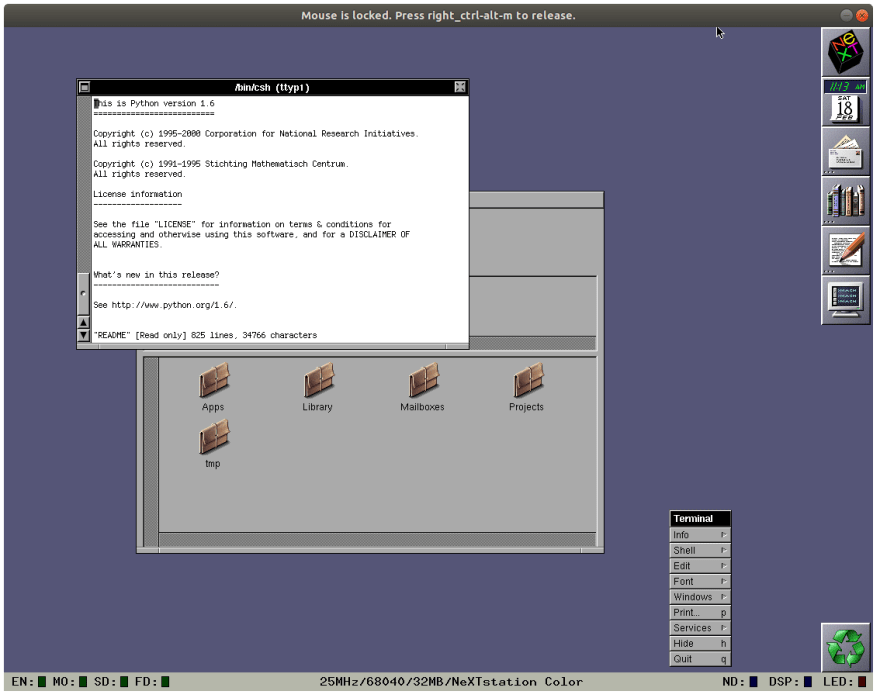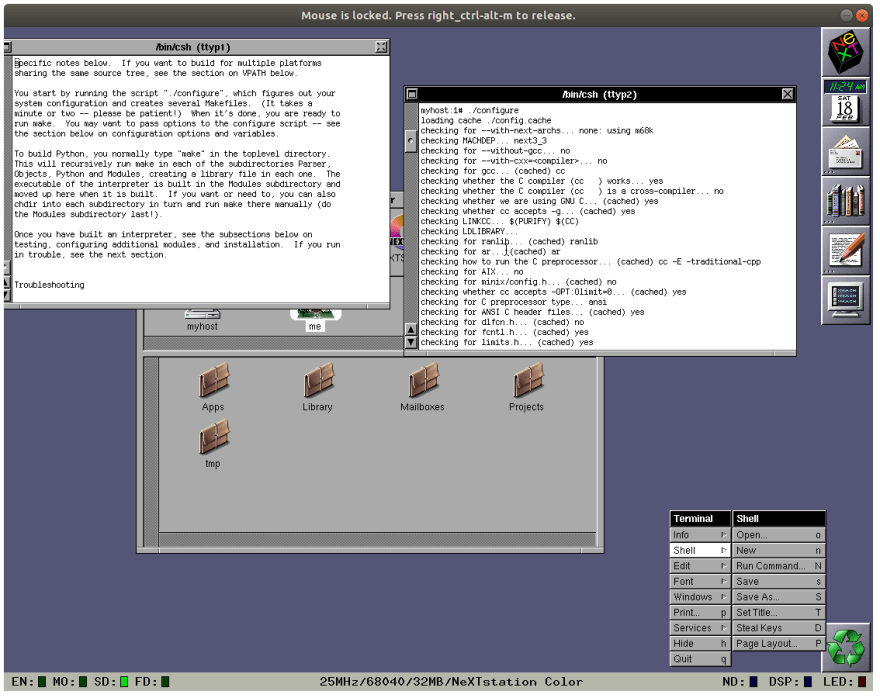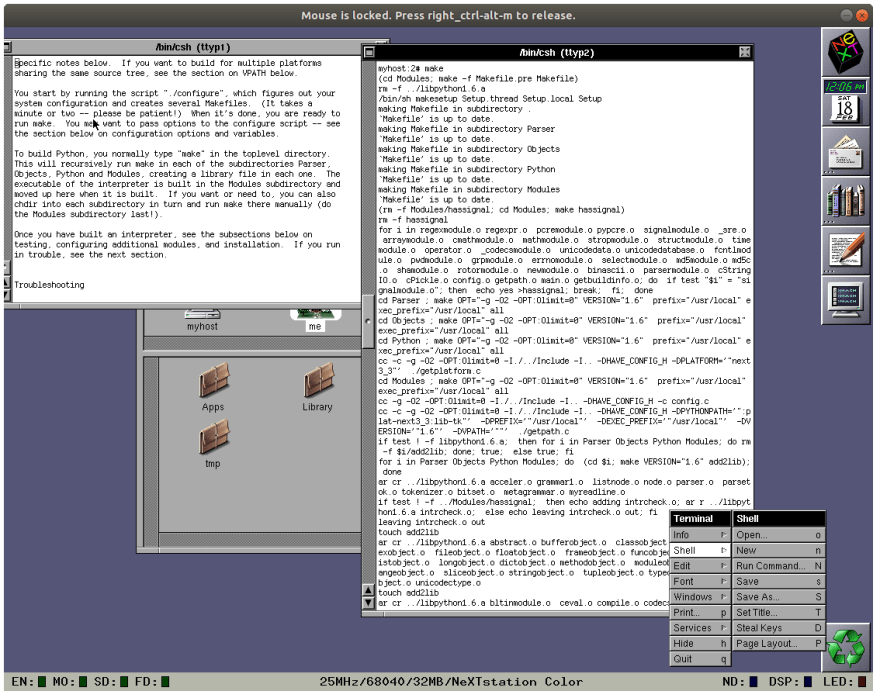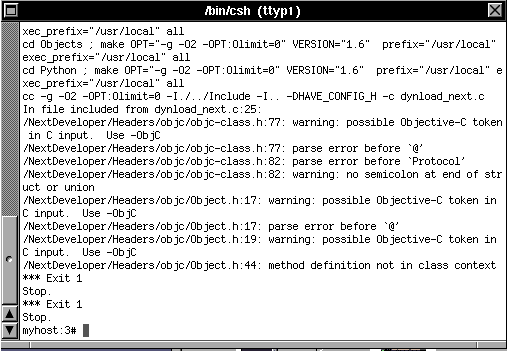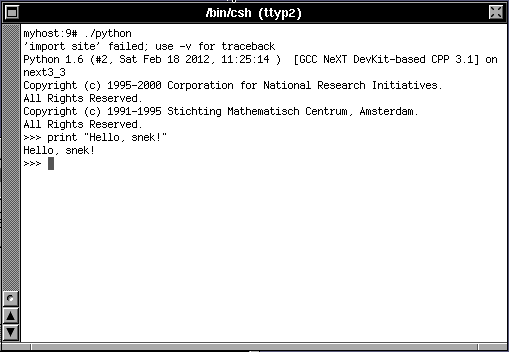Compiling Python from source, for fun and frustration

goyder
Posted on February 10, 2021

In this series, I'm documenting my experiences with attempting to write and execute a machine learning program (any machine learning program) in Python 1.6 on a NeXT hardware emulator running NeXTSTEP.
As of the last post, we have:
- Previous, the NeXT emulator, up and running.
- NeXTSTEP 3.3 up and running.
- An NFS server up and running, and the NeXT machine connected to it.
- The NeXTSTEP DEVELOPER environment installed and functional.
We're now at the pointy end - it's time to attempt to compile Python 1.6 from source.
Goal
Our goal for this session is simple and clear: compile Python 1.6 from source, and confirm the interpreter works.
Challenges and decisions
Getting the source
The source code for Python 1.6 is actually still available on the main Python website, although it's not well advertised nowadays.
Interestingly, the download page for Python 1.6 has some broken HTML, and it's not possible to click through to agree to the license agreement. However, the download page for Python 1.6.1 is still functioning, so I went with that.
Using the NFS previously set up, it was straightforward to move the source tarball into Previous, unpack it, and start to look through the README.
It's always valuable to look at the README.
Getting going...
Flicking through the README, I note that there's special installation instructions for each platform, including NeXT... however, there's nothing other than a note about "fat binaries" (a term which prompted a Google from me, but not much else).
The build instructions are straightforward: first, I just have to run the script ./configure, which I promptly do. This runs through a huge number of checks, all of which are satisfactory:
And then I just have to run ./make, which begins strongly:
Look at those compilations fly!
...and stopping...
Pretty quickly after compilation, it halts with the following error:
Seems like there's an issue with the NeXTSTEP DEVELOPER provided C standard library implementation - apparently they've mixed in some Objective-C. This is maybe not surprising (Objective-C was the primary language of choice for NeXT, and for Apple products from OS X onwards until Swift came along), but I am a little surprised it would be implemented in such a way to crash regular C compilation.
Fortunately, the fix has been provided in the error message (that's friendly!) and that can be implemented under compiler options in the very well organised Makefile, changing
# Compiler options passed to subordinate makes
OPT= -g -02 -OPT:0limit=0
to
# Compiler options passed to subordinate makes
OPT= -g -02 -OPT:0limit=0 -ObjC
With this change made, calling make has the compilation process buzzing along!
...and stopping again...
However, this doesn't last. Once we get to the Modules section of the compilation process, it bombs out on a compilation error - not enough arguments for a C function, it seems.
I'm not terribly familiar with C compilation, so I'm really coming up the learning cliff on this one, and I take a bit deep dive. After a fair bit of investigation I find:
- Something's crashing in the
_localesmodule. The code is making a call tostrcolland crapping out, saying there's not enough arguments. That feels like a very blatant oversight for the reasonably-mature-at-this-point Python codebase, so I take a closer look. - In the Python codebase, I find the line where it's dying, and confirm there's a call to
strcollwith two arguments,s1ands2. The call in_localmodule.Cis perfectly normal - totally textbook! This is a bog-standard implementation of a bog-standard C function. - I then dug into the
string.hfile installed with NeXTSTEP DEVELOPER and it's... odd? The function has a totally different signature:int strcoll(char *to, size_t maxsize, const char *from)Thismaxsizeargument seems to come out of nowhere, and is borking the install. - Looking up this specific implementation, the only reference I find to this signature is in the book "Software Engineering in C", which notes that it "documents the proposed ANSI standard C, which is expected to be ratified in 1987."
- I looked up the ANSI standard C implementation of
strcoll, andmaxsizewas nowhere to be seen.
Or, summarising these findings up in a chain of "whys":
What a journey.
Overall, something's a little awry here - I would love to find out the history of this strange implementation, because I could find naught in my searching.
A limiting, but effective, workaround
Thinking there might be a solution in the README, I went back and re-read it. After reading from top to bottom, I found an interesting message for installing under SunOS 4.x:
When using the standard "cc" compiler, certain modules not be compilable because they use non-K&R syntax. You should be able to get a basic Python interpreter by commenting out such modules in the Modules/Setup file, but I really recommend using gcc.
This sounds good. We're certainly getting errors due to non-standard syntax (although perhaps not like they meant).
I'd previously looked into gcc, but couldn't find a non-NeXT provided implementation for NeXTSTEP. However, a "basic python interpreter" could certainly be sufficient.
Sure enough, I was able to jump into the Modules/Setup file and begin commenting out the troublesome modules as they cropped up during compilation. (Interestingly, it seems there's a lot of intended variation in what modules to install, based on the notes within this file.)
This feels janky, but effective. I can only hope the finished product is sufficient for my needs.
Hello, snek
Slowly but surely I made progress until it is complete: the make process ran to completion (approximately 1 hour of uninterrupted compilation time) and I am greeted with a single blessed python executable file.
I run it, and I am greeted with the beautiful sight of a Python interpreter (and one minor error):
[GCC neXT DevKit-based CPP 3.1] on next3_3 - I'd like to think that's a compilation message that isn't often seen.
I ran some basic tests, instantiated and worked with a variety of data types - the interpreter seems good and functional. Success!
What next?
With the Python interpreter up and running, the only thing left to do is write the basic machine learning script in mid-90s era Python and claim victory!
Series review
Where have we got to?
At this point we have:
- Compiled Previous
- Found pre-built images of NeXTSTEP.
- Successfully mounted and launched an image of NeXTSTEP 3.3.
- Set up a fileshare so we can easily get files onto the system.
- Found an image of the NeXTSTEP developer tools.
- Installed the developer tools we so have the capability to build Python from source.
- Downloaded the source code for Python 1.6 and transferred it onto the NeXT machine.
- Compiled a (hacky, slightly incomplete) version of Python 1.6.
How did we get here?
In this sesh we:
- Pulled the Python 1.6.1 source code from the Python website
- Transferred the files onto the NeXT machine via our NFS
- Found a "workaround", albeit a limiting one, for our issues with compiling Python 1.6 from source
- By commenting out troublesome modules from the
Modules/Setupfile, we are able to progress and complete compilation.
- By commenting out troublesome modules from the
What could we explore further?
- The guidance for compilation noted that the removal of modules might not be necessary if using a bog-standard gcc implementation, rather than NeXT's custom version. It could be worthwhile to find an implementation of gcc for NeXTSTEP 3.3 - I've seen enough rumblings on the NeXT forums to think this is possible.
- There are updates available for NeXTSTEP 3.3, and potentially the NEXTSTEP DEVELOPER codebase. Applying these updates may help solve the non-standard C libraries.

Posted on February 10, 2021
Join Our Newsletter. No Spam, Only the good stuff.
Sign up to receive the latest update from our blog.
